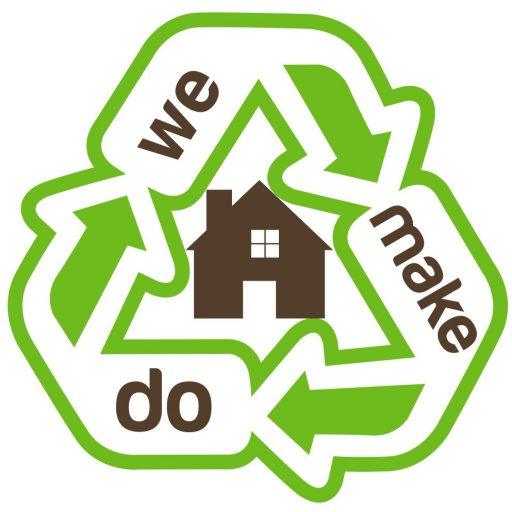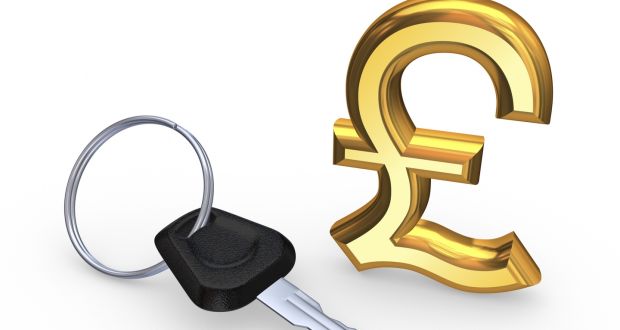
by wemakedo | Aug 21, 2016 | transport, Uncategorized |
Image courtesy of The Irish Times.
With the Euro / Sterling exchange rate recently becoming much more attractive for car buyers considering a UK import, we thought we’d describe our recent experience with this process for buying a car.
Our new arrival in November which brought the brood to three meant that we had to rethink our car situation. Neither of us care too much about the appearance or brand of car we drive but let’s face it, in rural Ireland one tends to spend a lot of time driving. So having a car that matches your needs makes moving the family around easier and maybe somewhat pleasant. Our VW Passat estate just wasn’t up to the job of managing three kids car seats easily. Having spent the winter in Alaska where our in-laws use MPVs, the obvious flexibility of these vehicles was compelling and as one gets older and busier with kids, one tends to look more at the practicality of things than the cosmetic appeal. We came home with the plan to upgrade (or downgrade depending on your view).
Figuring we’d save some cash, we opted to try to sell our own car first. So we cleaned it up, took some pretty pictures and posted our 2011 VW Passat estate online and watched the “views” roll in. Lots and lots of tyre kickers it seemed.
But no calls.
We dropped the price to try to spur the interest (14,500, down to 14,000).
Finally we had an interested person, the only interested person as it turned out, who came and viewed and bought. It only took about 6 weeks and we got 13,500 in the end. A decent price considering the advantage it gave us in making our next purchase.
For various reasons we had settled on a Peugeot 5008 7-seater as our replacement. Having bought a UK import before through a local dealer we decided to try this path again.
The exchange rate plays a big factor in whether this route is advantageous. At the time we started talking to a dealer about doing this, the Stlg/euro rate was at 1.27. Not a good exchange going by historic trends but surprisingly it was good enough to make a saving. The average UK car tends to be higher spec than the Irish equivalent and so the expectation is that you will get something at least nicer if not cheaper assuming the same year and mileage. For some it makes sense to travel to the UK, make the purchase and drive the car back to Ireland, sorting out the VRT payment along the way. We weren’t prepared to travel and so we opted for one of many dealers now who will offer this service for their own fees.
The appearance of online auction sites where buyers can get full bidding access has made this process much simpler than it used to be – both for dealers and private buyers it should be noted. In the two times we have been through this process, no one connected to the dealer was physically inspecting the car to ensure that it was good purchase. Instead the more reputable auction sites use a pre-check process that rates the cars according to their mechanical and cosmetic condition. Grade 1 is as new, and grade 3 is decent while a grade 5 might have warning lights showing or some serious bodywork issues. Apparently the dealers trust this assessment and rating enough to bid remotely on the car on your behalf. In other words they are not doing anything that you can’t do yourself except taking the logistical hassle out of the process. Also note that there is a fee for buying at these auctions which is related to how frequently you do it, and so a dealer will benefit here over the once-off buyer who pays more –for example 9.5% of the purchase price for a £10,000 value car was quoted on one site, which is significant.
One thing to beware of at this point: For a dealer who buys a car this way and then offers it to you with warranty cover, they are providing additional value on top of the car. Knowing that the car that was bought unseen will have a warranty with your local dealer certainly reduces the risk and brings some peace of mind. One dealer I bought from before did this but in this most recent case, the dealer has outsourced this to “Mapfre”, so for a discounted price I could buy a warranty from them for a year to cover the car. Apparently when you buy an extended warranty on a new car in Ireland It may be covered by this Spanish company based in ireland, so they are well established in this market.
The point for me though was that if I did buy this UK auction car myself and avoided having to pay a dealer to do it for me, then a concern was that I would not have a warranty, until I realized that I could buy one if I wanted. This makes the idea of doing this whole process myself quite feasible and with low risk.
Would I bother?
Certainly after going through this process and seeing how it works, and feeling that the dealer did little for his cut other than get the car shipped over to me and put through the VRT payment process, I would strongly consider it.
You get to pick your car, and importantly you get to bid yourself so you know exactly what you are willing to spend as the bidding is driving the price up during the auction. This avoids the difficulty of having to provide a bid limit to the dealer in advance without knowing if it will be enough for a successful outcome, only to find out later that you lost your ideal car to another bidder for the sake of another hundred quid.
Some useful links:
To transfer money from euros to sterling – I recommend avoiding banks and going with Transferwise a most excellent facility that charges the least for exchange transfers.
Of course we bought before “Brexit” happened, and so now the post- Brexit exchange rate being in your favour, makes this a most attractive option for those willing to put in the additional effort.

by wemakedo | Aug 12, 2016 | Uncategorized |
…but does that really mean buying brand new stuff?? Or does it mean saving money for more important things, and reducing the landfills that our kids will have to deal with when they grow up?
When we started this blog our intention was to share our ideas on reducing waste, while saving money. One of the things we hear regularly from other parents is how expensive it can /will be to rear children. There is no doubt it can be, but it for sure doesn’t need to be at least during their younger years (0-6 or 7 years).
We started the Baby Market in November 2011 (along with a colleague from a previous job) when our first child was 8 months old after finding that there was no place to buy quality second hand baby goods in Cork. We couldn’t understand why this didn’t exist here already: Ireland was experiencing a baby boom, the recession was in full force, and much of the baby stuff we buy or receive is hardly used by the time it is outgrown. To us, buying new things for our children felt obscenely unnecessary given the amount of these goods in circulation at any time. I didn’t want my new baby’s miraculous arrival into this world to be accompanied by heaps of plastic junk, bouncer chairs, buggies, changing tables, rattles and other unnecessary things that only get in the way of enjoying your new baby, and end up cluttering your house and your life. Give me a sling for carrying her and a few comfortable shirts that I could breastfeed in, and that’s all I wanted.
But after a few months, we did want a few things. A cot would be nice, and maybe I did need a buggy. A second car seat for the other car, some toys, books, clothes other than babygrows and maybe a bouncer after all. We were lucky enough to get many of these things second hand from family. But what did other people do? And what would we do when we were done with these things? They took up a lot of room. And they were still in perfect condition, even after 2 or 3 owners.
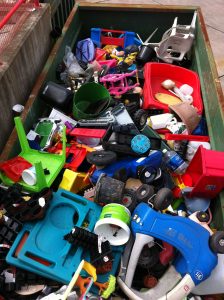
Around this time, I was at our local recycling centre and I took this picture of a skip completely filled with baby and children’s goods. The staff there mentioned that this was a typical week’s worth of hard plastic recyclables. I couldn’t believe my eyes! How utterly wasteful for these large plastic objects, many of which appeared perfectly usable, to be dumped! And when I inquired as to where the hard plastic recyclable waste stream was going, I was unable to get a direct answer…a question for another day.
New parents are so vulnerable to marketing. Marketers will reprimand you for not considering the absolute best or safest products for our children. This leads us to purchase way more than we need, perhaps spending more than one can afford at a time budgets are being stretched by a new family member. Well meaning friends and family come showering us with gifts, all of which are beautiful and thoughtful, but perhaps not entirely necessary…I know that for every new item that comes into my possession, another one or even two items are manufactured. When my first was born, I desperately didn’t want her arrival to mean another 100 kilograms of plastic consumption per year added to the environment. And the easiest way to try to battle this was to look for second hand items from day 1.
I felt it was URGENT and ESSENTIAL that an option to buy second hand should be available to all parents. And so The Baby Market was born.
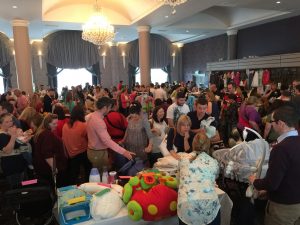
A recent busy Cork event
Shopping at the Baby Markets can save new parents hundreds of euros on the cost of baby and children’s goods while maintaining high quality standards. Parents that need to declutter can rent a stall and sell on their used children’s items, thus clearing out their house and making back money. The markets are financially beneficial for both buyers and sellers, while also tremendously benefiting the environment by providing an outlet for reusing good quality items rather than discarding them unnecessarily.
A third benefit from the markets has to do with empowering women, particularly stay at home mums, to start up their own businesses. The Baby Markets are run as franchises, with each event run by an organiser with ties to the local community. People contact us if interested in starting a new location and we provide materials and training, which along with their own skills and hard work will see them starting up a profitable business from the first event. This allows women who are highly skilled and choosing to stay at home with their kids, to maintain and increase their business skills while working from home. It also offers a venue for a thriving selection of small home based businesses to sell their wares alongside the second hand goods.
Baby Markets are every 6 weeks in Cork, and every 2 months is Dublin, Limerick, Tralee, Ballinasloe, Navan, and Carlow. See
www.babymarket.ie or our
Facebook page.
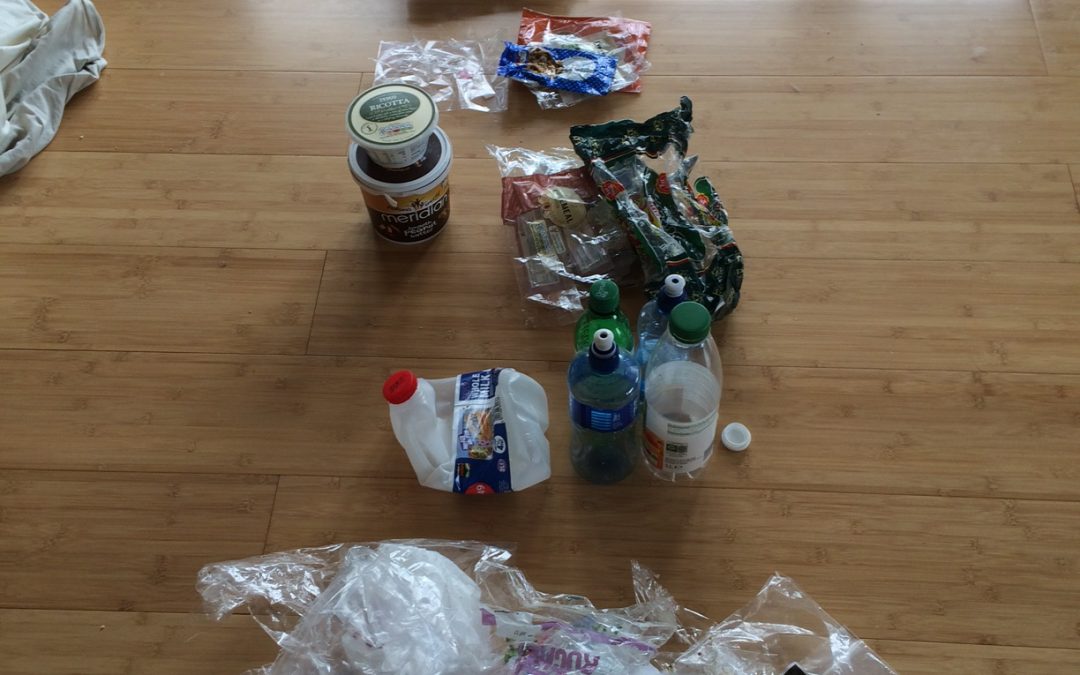
by wemakedo | Aug 7, 2016 | Uncategorized |
Plastic Free July ended, for us, with a whimper rather than a satisfying bang as the family headed off to the Southeast of Ireland for 10 days of camping. Suddenly all the changes we had made were overwhelming for us to keep up. Gone were the cloth nappies and washable wipes, cheese and snacks were again purchased in plastic and we found ourselves in possession of a few plastic bottles. However, while on our holidays, we continued to talk to people about our effort this month, which to us, feels nearly more productive than attempting to perfectly execute zero plastic consumption ourselves. Collecting collaborators in our effort is essential, and the process is futile without finding like minded people to join us.
To summarize our learnings, we found the greatest reduction in plastic use by going to cloth nappies (and potty training), using washable wipes, shopping at the local Farmer’s Markets using our own containers to buy produce and fish, shopping at Super Valu over other major chains for items we couldn’t find at the Farmer’s Market, and sourcing bulk beans, lentils and noodles at the English Market. This month also gave us the opportunity to try making some of our favourite snacks that came heavily packaged, such as yogurt, crackers, breadsticks and granola. Our biggest challenge was in finding dried fruit and nuts without lots of packaging (which we still haven’t done…)
So we made it to the end of plastic free July. Putting ourselves through this process has been a superb education about an issue that deserves some attention and that we can help with by changing some simple habits. We would certainly say that it was harder than we both expected…having had to forego many foods during July that we would just rather not live without, it will be nice to go back to those.
The thing is though that its hard to ignore the prevalence of plastic in our lives now that we have forced ourselves to pay attention. So thankfully our new perspective will mean that we plan to avoid a lot more that can be easily avoided, while continuing to look for sources of those things that eluded us during July. We’ve even considered whether or not there would yet be a strong enough demand in Ireland (yet) for unpackaged foods to justify bulk foods stores. Would such as business survive here yet? From our online searches, it seems that it won’t be long before these begin to appear in Ireland, as more and more people are becoming aware of waste issues and that in the case of plastics, recycling isn’t a solution.
Bring on Zero Waste Week in September! But until then, we’ll be discussing other things!

